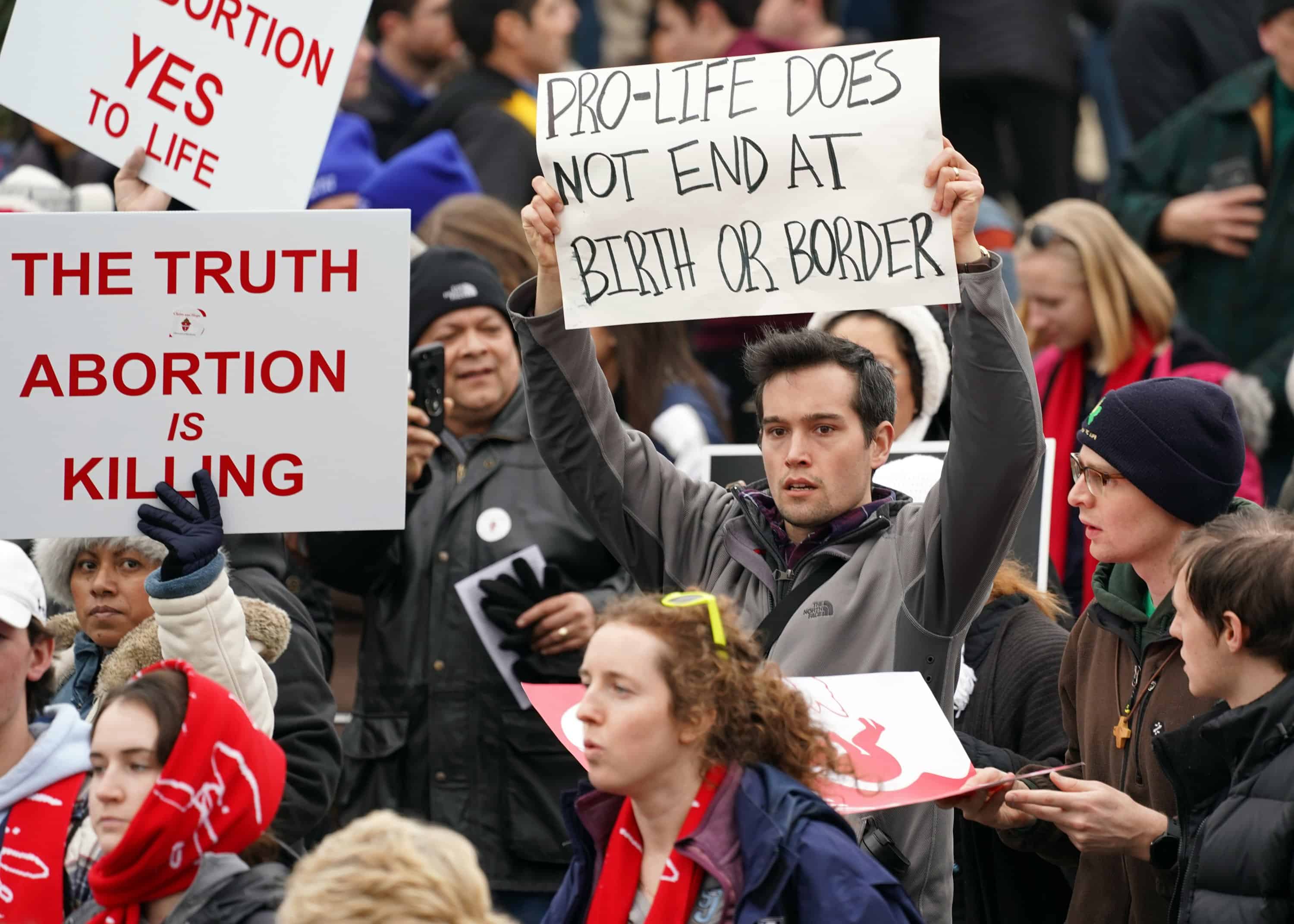What does it mean to be Catholic and attend the March for Life? It is not a question many had to ask until recently. The right to life has always been at the heart of Catholic Social Teaching (CST). It is integral to what is called the “Consistent Ethic of Life,” including the dignity of all humans (babies, immigrants, refugees, the elderly, etc.) Thus, the March has a strong Catholic history and Catholics continue to comprise a large portion of the tens of thousands of protesters in Washington and in local marches every year.
But in recent years, Catholics in good conscience have started to question their role in the March. President Trump has been vocal about his support for the pro-life movement, and he addressed the marchers personally this year’s March. But many have raised concerns about his treatment of women and stance on other life issues. Despite what many media outlets are broadcasting, to equate the March for Life with a Trump rally would be unfair and inaccurate. Most images from the March show President Trump addressing the crowd while thousands of pro-life advocates watch on jumbotrons, but they didn’t come from across the country to see him. They came to advocate for justice for the unborn.
It is true that the March for Life is inherently political. The March takes place on the anniversary of Roe v. Wade in front of the Supreme Court and Capitol buildings. Marchers gather to show their lawmakers that the American people deserve legislation that includes legal protection for the unborn. The goal of the March for Life is political change. But the political change we seek doesn’t fit well into the partisan dichotomy we face today. Catholic Social Teaching affirms the right to life for all unborn children, but never at the expense of other pro-life issues. The consistent ethic of life invokes the imagery of a “seamless garment.” This recalls the cloak that Jesus wore on the day of his crucifixion, which was woven in one piece from top to bottom. Similarly, the consistent ethic of life cannot be separated and has to be taken all together. Catholic Social Teaching demands the right to life and dignity for all humans. Period. Sadly, very few political candidates and neither of America’s major political parties completely uphold all elements of the consistent ethic of life preached by the Catholic Church.
Trump was met with cheers and applause as he addressed this year’s March. In his address he said, “Unborn children have never had a stronger defender in the White House.” Many rejoiced. Others watched quietly. Is he right? No other “pro-life” president ever attended or addressed the March. This year, President Trump did both. Pundits may argue about Trump’s authenticity or political strategies, but they cannot deny that President Trump is making legal protection for the unborn a federal priority. Catholics can and should celebrate President Trump’s leadership on this component of Catholic Social Teaching. But at what cost?
President Trump has acted personally and politically in ways that deny the dignity of other forms of human life. One woman at the March shared how she felt betrayed when she saw her “pro-life” president mocking a handicapped person on national television. She marches each year especially for children who are aborted by parents when they learn about potential birth defects. Upholding the life and dignity of handicapped people is as important in CST as legal protection for the unborn. Why do so many faithful continue to come to the March for Life in spite of the mixed message from President Trump? How can the Church (i.e. the people) continue to support the pro-life movement?
Here’s where Mary (as always) can help. During the wedding feast at Cana, Mary was attentive to the needs of her close friends and relatives. She noticed when the hosts ran out of wine before the celebration had ended. Aware of their needs and sensitive not to expose them to shame, Mary took the problem straight to Jesus. “They have no wine.” Mary did not tell Jesus how exactly he should go about fixing it, she simply presented the problem to him. Trusting completely in Jesus, she turned to the servants and said, “Do whatever he tells you” (John 2:1-11).
Like Mary, we recognize a problem. Thousands of babies are murdered every day through abortions. This multi-layered issue can feel overwhelming. Mary teaches us to bring the problem first to Jesus. We go before the Lord in a quiet moment of prayer and tell him exactly what’s happening. “Jesus, they’re murdering their own children,” and stop there. We don’t tell Jesus what he needs to do about it. We don’t need to finish the sentence with the political party or candidate whose election will “make everything better.” Instead, we trust in the God of surprises; who changed water into wine; who rose from the dead and defeated the powers of darkness; who can use anything or anyone to accomplish his divine will; who rejected every system of power that we think is important or necessary; who came into this world as an unplanned pregnancy to poor, unwed parents; whose death on the cross is the means of our life and salvation. That’s the radical hope we have in Jesus. Jesus is the Way, the Truth, and the Life. We march for Life.


